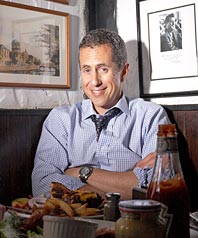
Just before eight on a lovely fall night, Danny Meyer navigates a sawdust-strewn path to the indisputably worst table at Molly’s Shebeen, the one wedged improbably between the bathroom and the kitchen of the archetypal Irish pub. Meyer, owner of Union Square Cafe, Gramercy Tavern, Shake Shack, Blue Smoke, Tabla, Eleven Madison Park, and the Modern, is known for his punctilious management style and hospitality fetish—so much so, he’s written a book on the subjects, Setting the Table (HarperCollins), which comes out this week. And with the pungent aromas of French fries and urinal “cakes” colliding to what could hardly be called appetizing effect, this would seem a perfect opportunity to launch into a learned discourse on graceful seating plans and discreet lavatory fresheners. Instead, Meyer tucks his already loosened tie into his shirt, casts a satisfied glance about this ancient hut of a room, and proceeds to discuss the origins of his pioneering version of hospitality.
“You know, the traditional Irish pub was a big influence on my idea of hospitality,” he says. The kind of place, he elaborates, “where Clancy reaches across the bar, knows me, knows my name, and even though he knows my favorite drink, he still says, ‘The first one’s on the house. What’ll it be?’ ”
That interaction, with Clancy or some version of him, is what Meyer calls a dialogue. A monologue is what happens when a restaurant imposes its idea of what you want on you, a frequent occurrence even at the most refined four-star restaurants. At present, though, as he nurses a pint of Smithwick’s, he’s having neither a monologue nor a dialogue, since no one has been by to take a food order for fifteen minutes. As soon as you start wondering what he makes of that, a blonde with a light brogue arrives, pen poised, and Meyer places his order with the precision of someone who doesn’t like to leave room for error: “Chicken wings for the table. And I’d like a medium-rare American cheeseburger with bacon, please. And is it possible to do the bacon on the crisper side? Thank you very much.”
It’s brought to his attention that the table assignment is probably the result of a reservation mishap: a booking for 7:45 was recorded as 7.
“That’s a service error, not to honor the commitment of a reservation,” says Meyer, warming to his subject. “Hospitality could have overcome that. It’s an important distinction. Service is delivering on your promise. Hospitality is making people feel good while you’re delivering on that promise.”
How would he handle it?
“I would want our team to say it sounds like we made a mistake.”
What if he knew they didn’t, if the customer was simply a crackpot?
“I would still say it sounds like we may have dropped the ball on your reservation.”
In other words, lie?
“Yeah, what the … Well, I said, ‘It sounds like.’ That doesn’t mean we did.”
What a layperson might deem splitting hairs is only a nuance of the “enlightened hospitality” Meyer preaches in Setting the Table. Part memoir and part business manual, the book tells the story of how a food-obsessed Missouri boy surrenders to his restaurateuring impulses and goes on to fashion a considerable empire and the kind of civic-minded reputation politicians dream of. Like many in its genre, it’s filled with maxims and metaphors, many sports-related and all imbued with a trademark warm and fuzzy message of doing well by doing good.
The hope tonight was to see its principles in action—or not—and have the expert weigh in. Thanks to Meyer’s notoriously nice-guy persona, though—and exceedingly diplomatic manner—the hope was nearly dashed.
“The fact is, I don’t give a damn whether our service is good or not tonight,” says Meyer. “As a matter of fact, I think we can have an even better time because we’re at a place where it just doesn’t matter.”
True, Molly’s doesn’t seem the sort of establishment to prioritize its stakeholders in a “virtuous cycle of enlightened hospitality”—a Meyerism that refers to putting your employees first and your investors last. But that’s not to say it doesn’t have anything instructive to offer.
“I love this beer,” says Meyer. “Wouldn’t this be a great thing to serve at Blue Smoke?”
What about the noise level? “It’s great,” he says, amid the occasional kitchen clang. “The perfect noise level creates this veil of privacy around your table.”
On the layout of the room, he’s willing to offer a bit of constructive criticism. “The seating arrangement is great. If this were my restaurant, I’d do one thing. I’d build just a little baby partition next to us here, and a little one here,” in effect transforming a busy, open corner into a snug oasis.
On the way out, however, Meyer returns to form. “I love the booths,” he says, admiring the scarred wood benches by the door. “They’re hospitable.”